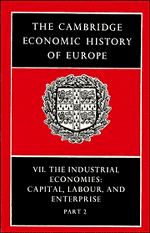CHAPTER VIII - Russian Entrepreneurship
from RUSSIA
Published online by Cambridge University Press: 28 March 2008
Summary
Entrepreneur or Manager?
Regulation has been the substitute for entrepreneurship in Russia during the thousand years of its recorded economic history, and in the past five decades regulation has eliminated entrepreneurship altogether. The state cannot be considered to be the entrepreneur because this function can be exercised only by its citizens: Peter the Great established a framework of controls and incentives which induced the freemen among his subjects (and a very few foreigners) to act – and to continue to act – in new ways; Stalin's system, by contrast, prevented anyone from departing from the path which he or his officials defined as progressive. Since the First Five–year Plan, personal autonomy in the taking of economic decisions – a necessary feature of entrepreneurship – has not been permitted, but in the quarter-century before that deprivation every citizen had had the right to become an entrepreneur. In both earlier and subsequent times, however, the farm worker had much less liberty than the rest of the population. The serfs had been emancipated in 1861, but for another hundred years the country remained a predominantly rural society; townsmen, less than one-sixth of the total at the start of the century, came in 1961 exactly to equal the number of villagers, whose history had been one of uninterrupted restriction until the reform of 1906 and the Revolution of 1917. By determining the actions of those in their service, both Tsarist and Soviet governments have imposed the productive dynamism they desired.
- Type
- Chapter
- Information
- The Cambridge Economic History of Europe , pp. 416 - 494Publisher: Cambridge University PressPrint publication year: 1978
References
- 2
- Cited by

